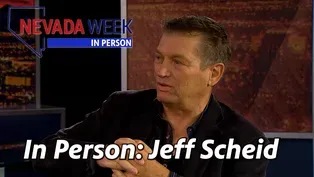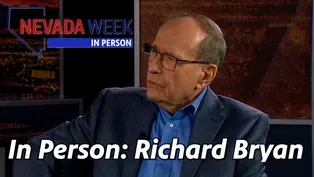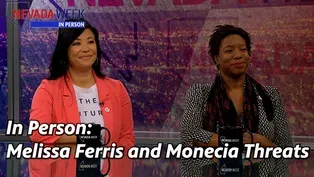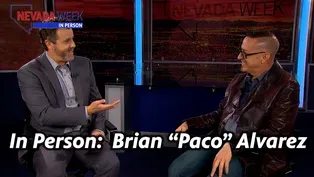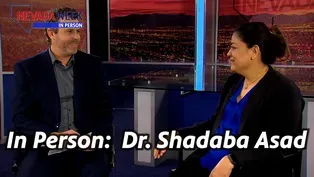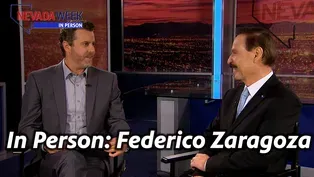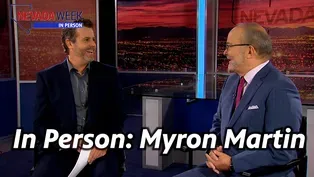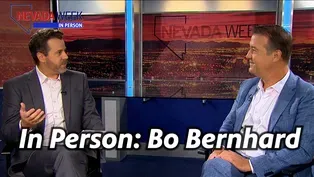
Nevada Week In Person | Aaron Berger
Season 1 Episode 8 | 13m 59sVideo has Closed Captions
We talk with the executive director of the Neon Museum, Aaron Berger.
We talk with the recently appointed executive director of the Neon Museum, Aaron Berger.
Problems with Closed Captions? Closed Captioning Feedback
Problems with Closed Captions? Closed Captioning Feedback
Nevada Week In Person is a local public television program presented by Vegas PBS

Nevada Week In Person | Aaron Berger
Season 1 Episode 8 | 13m 59sVideo has Closed Captions
We talk with the recently appointed executive director of the Neon Museum, Aaron Berger.
Problems with Closed Captions? Closed Captioning Feedback
How to Watch Nevada Week In Person
Nevada Week In Person is available to stream on pbs.org and the free PBS App, available on iPhone, Apple TV, Android TV, Android smartphones, Amazon Fire TV, Amazon Fire Tablet, Roku, Samsung Smart TV, and Vizio.
Providing Support for PBS.org
Learn Moreabout PBS online sponsorshipMore from This Collection
Nevada Week In Person | Jeff Scheid
Video has Closed Captions
A one-on-one interview with longtime Southern Nevada photojournalist Jeff Scheid. (14m)
Nevada Week In Person | Richard Bryan
Video has Closed Captions
Retired Nevada Senator Richard Bryan talks about his life in service of the state. (14m)
Nevada Week In Person | Monecia Threats and Melissa Ferris
Video has Closed Captions
Monecia Threats and Melissa Ferris talk sports in Las Vegas. (14m)
Nevada Week In Person | Brian ‘Paco’ Alvarez
Video has Closed Captions
A personal interview with arts and culture curator Brian ‘Paco’ Alvarez. (14m)
Nevada Week In Person | Dr. Shadaba Asad
Video has Closed Captions
Infectious disease expert Dr. Shadaba Asad on the coronavirus pandemic. (14m)
Nevada Week In Person | Federico Zaragoza
Video has Closed Captions
An in-depth and personal conversation with CSN President Federico Zaragoza. (14m)
Nevada Week In Person | Myron Martin
Video has Closed Captions
An in-depth personal discussion with Smith Center CEO Myron Martin. (14m)
Nevada Week In Person | Bo Bernhard
Video has Closed Captions
An in-depth conversation with Bo Bernhard from UNLV about his work with the university. (14m)
Providing Support for PBS.org
Learn Moreabout PBS online sponsorshipThe Neon Museum is much more than a resting place for old Las Vegas signs and thus, the Neon Museum's leader, we might assume, is much more than just a traditional museum director.
Well, this week on Nevada Week In Person, we talk with the museum's recently appointed executive director.
♪♪♪ Support for Nevada Week In Person is provided by Senator William H. Hernstadt and additional supporting sponsors.
(Kipp Ortenburger) Las Vegas has always been shaped by the new people who come here.
Well, now that the museum houses some of the oldest symbols of our young city, they have a new executive director.
Aaron Berger joined the museum in July, and he joins us now.
Aaron, thank you so much for being here.
-Oh, no, it's my pleasure.
Thank you.
-Absolutely, especially with just a couple of months on the job.
-This is a great place to be.
I'm thrilled to be here.
-Absolutely.
I want to talk a little bit about where you've been: Marietta/Cobb Museum of Art, the Albany Museum of Art, Breman Museum of Art, the Jewish heritage museum.
The others are more focused on art, and then you come here to the Neon Museum.
I mean, talk about your experiences maybe in those more traditional museums-- and I hate to use that word because maybe they're not-- and what the Neon Museum is.
(Aaron Berger) So two of them are traditional art museums.
One was an American art museum, one was multinational.
Then the Breman Museum was the Jewish museum for the South, so that was a very non-traditional collection and a non-traditional mission.
But the opportunity to work with the Neon Museum, the collection, be in Las Vegas, this is my dream job.
This is the greatest place to be.
-I mean, those previous jobs and, you know, you were involved in curation, and you were involved in leadership and direction of the museum as well.
Did they prepare you for something like a museum that is almost all outdoors and is dealing with such interesting forms of technology and tourist base?
There's so many interesting things about it.
-It really is, and certainly I feel very well rooted in museum standards, museum ethics and museum operations.
Those things are very innate after 25 years in the business; however, we're working with a collection that is exposed to really brutal conditions.
You know, we have 120-degree days in the summer, we have monsoons, we have wind storms, we have freezing temperatures in the winters, and in the midst of all of this, we have to remember that the majority of our collection is actually glass.
So when you think about that juxtaposition of this very delicate nature of what we're presenting that's intended to be outdoors, the art pieces range from six months old to dating back to the '30s.
So it's really fascinating to me to learn.
This is very much a learning curve for me in how to care and present these pieces.
-Yes, and these are works of art that were developed to be outside, but were they developed to be outside for this long was really the big question, so a huge challenge.
-But I think you said something really fascinating, which is they're works of art.
And so they are commercial signs, right, so they have an intended purpose and yet there is an artistic side to them.
And that's one of the things that personally really attracted me to the museum was the opportunity to really explore the artistic side of neon, how neon is made.
Everyone knows how an oil painting is constructed and the layering of paint, but we don't really understand, the average person doesn't really know how neon is bent and how this craft is done.
So that's one of the things I'm really hoping to explore further as we kind of go down the road and be able to give people opportunities to learn from that.
-That's interesting, because the museum doesn't necessarily educate on that now, so that's something we might see in the future.
That's fascinating.
-Yes, very much.
One of the things that's top of my list is we are raising money for a mobile glass bending studio.
So it's this little dream of being able to take a-- we're going to refurbish a food truck and take it to schools, take it to libraries, community centers or just park it in our own parking lot, and you'll be able to see neon being bent and have a better understanding of really how incredibly difficult this process is, and then to have something that's going to endure 75 years again in a brutal environment.
-And such a great integration of science of course into the art, as we like to call STEAM.
-STEAM education is at the core of what we do.
-Yes, absolutely.
So the local connections are great, but a lot of tourists come to the Neon Museum and you're competing against so many other attractions, and yet you've got great visitation.
-We do.
We have over a quarter million traditionally coming through the museum in a year, and it is about 90% tourist based.
But that said we really want to become the home of our locals as much as we are for those visitors coming into the city, so we're doing things to try and open our doors to be barrier free, to encourage as many visitors as possible to feel welcome within the museum.
-Sustainability and growth is interesting in this conversation, because if you get tourists coming, then you obviously have, you know, the fees for that part of it, but the local business is really important too.
I'm assuming that's where a lot of your fund development, your donations are coming from.
I mean, is the Neon Museum in a better position maybe sustainability-wise by revenue than a normal museum?
-Traditional museums receive about 15% of their operating budget from just gate sales, admissions coming through the front door.
The rest is through memberships and through, you know, online solicitations and active cultivation and fundraising.
The Neon Museum is built differently, and we are very fortunate in that the largest percentage of our revenue is coming from those gate sales.
That said, I don't want the museum to allow money to be a barrier for people to be educated and to learn about Las Vegas history.
So one of our other fundraising initiatives right now is to really look at finding ways to provide free afternoons for local residents, free experiences or reduced-cost experiences so people can take advantage and learn while they're here.
So again, I don't want money to be a hindrance for someone to be able to learn something new.
-Yes, and that's a great point, this is integrated in our cultural heritage.
Neon is integrated in our cultural heritage unfortunately, or fortunately, however you look at it.
The Mob Museum of course is another big attraction, being they're a local museum that's very much integrated in our own history and our culture.
It's very unique.
Some of these museums we have are so unique to what Las Vegas is, and there's others.
There's the Liberace Museum, if you didn't know that.
We have the Pinball Hall of Fame, which somewhat of a museum as well.
There's many others.
I mean, when you kind of look at that, I know you haven't been in Las Vegas that long, but when you look at our culture, and not just kind of the unique but also going all the way back to what our historical cultural heritage is, are there other museums you think we could have here, should have here.
-I think that we have-- Las Vegas is unique in itself.
So we are a town known for gaming, you know, casinos and fun and just this irreverence that is sort of iconic Vegas.
We're also becoming a sports town in so many ways and identifying ourselves as a destination for sports.
There is certainly no reason why we can't become a destination for arts and culture just as well.
So I like to think that in many ways, we are a city for all people.
So whatever mood you're in, whether it ranges from again shows on the Strip to arts and culture, Las Vegas has it all.
-I want to come back to something you said before.
You're trying to engage the community more, especially with some of the free events you're talking about.
Neon is not something we think of necessarily reflective of diversity, the diversity of Las Vegas or the history of Las Vegas.
But are there ways to take a museum like the Neon Museum and bring in more aspects of diversity in the exhibits you're showing?
-Oh, 100%.
It's a shame that we're not equating neon with diversity, because they actually go hand in hand.
They're beautifully married.
One of the things that really struck me when I came through the museum for the first time was that I learned the story of the Black experience through the Moulin Rouge.
I learned about the Latin community here in Las Vegas and how their role was so integral in not only the sign making but also in the hotels and industries that were represented.
We have a huge LGBT story that is also really present.
So we're actually capitalizing on that and trying to explore those underrepresented stories even more.
So in the next couple of months, we've just hired someone this week actually, who is going to be developing tours specific to communities.
So as 2022 starts to unfold, you'll be able to book a tour that will help you walk through the Black experience of Las Vegas, learning about segregation and integration and how that played in this town, and as someone coming from Atlanta, the cradle of the civil rights movement, to be able to understand that from a very different perspective is really valuable.
Same thing again for that Indigenous people story, for the Paiutes and tell those stories.
That's all part of Las Vegas history.
So diversity is really core at what we're doing.
Within the first six weeks of joining the museum, we were able to launch our Spanish-speaking tours.
That's made a huge difference, and we're seeing that really take hold which I'm excited about, and we have a new mural that's launching in just a few weeks.
This mural is 800 square feet of showcasing these wonderful luminaries that are lesser-known individuals but who made amazing contributions to the building of Las Vegas.
So focusing on Latin Americans, focusing on again LGBT, focusing on Black individuals who really made a difference.
-You've already talked I think a lot about this, about some of the things that maybe you didn't know when you came here, but I wanted to ask-- and this is a question for anybody that's new.
I reflect back on when I came to Las Vegas and kind of what stood out to me.
But what's been the biggest surprise for you being a resident here more importantly, not a tourist, but a resident here in Vegas?
-So I have to say-- so I live Downtown.
I live four blocks from Fremont Street, and I love looking out on my balcony and seeing the incredible architecture around me and seeing City Hall, seeing of course everything, all the activity and lights on Fremont, but yet in the distance, there are the mountains.
And so there's this wonderful peacefulness off in the distance and the activity in the center of the city.
I absolutely didn't expect that.
I didn't expect to be able to find places of quiet and peace and solitude amidst all the fun and energy of the city.
-And I argue that films and media never seem to capture that part of what is around Vegas, right?
-Ever!
Which again was my enlightened moment of, you know, it was like day three where I was like this is really actually an incredibly peaceful, quiet place or can be.
-Yes.
Related to that, I know you're new again, but favorite place to be in Vegas maybe after work.
-After work.
I have to admit again being Downtown, I spend a lot of time in the Arts District so I have successfully put on a couple of pounds enjoying a few of the restaurants in town.
So there are shout-outs that I could probably be giving right now to certain places who are responsible for this, but it is great food and great energy.
I think the other great surprise that I've loved is sitting outside on one of the street-side tables and watching the bike rides on Wednesday night.
My favorite-- one of my favorite activities.
I can't wait to join them.
-And I caught that myself one evening out there actually enjoying a beverage myself.
-So good.
-Aaron, thank you so much.
-Thank you.
-We really appreciate it, a great conversation.
Now, for a more detailed look at the Neon Museum, go to our website to see a recent Nevada Week about art experience.
Support for PBS provided by:
Nevada Week In Person is a local public television program presented by Vegas PBS
